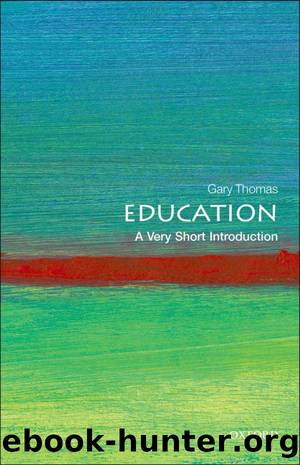Education: A Very Short Introduction by Gary Thomas

Author:Gary Thomas [Thomas, Gary]
Language: eng
Format: epub
ISBN: 9780199643264
Publisher: Oxford University Press
Published: 2013-12-15T06:00:00+00:00
[T]here is the word that dare not speak its name: selection. The majority of independent schools proceed by academic selection and they do that because they believe that it is fundamental to their success. So schools had every right to wonder whether this particular DNA was really going to be that useful.
There are important after-effects which emerge from the addition of market-type characteristics to education, most notably those that appear after the provision of information in the âmarketâ by testing and the publication of test results. This imposes such an unprecedentedly heavy test load on schools that the curriculum itself is distorted, with teaching and the judgements made by staff in schools about educational outcomes all bending to the pressure of achieving top results. The pressure is not just on staff, but on the children themselves.
How should we review the marketization story of the past thirty years? Perhaps most significantly, there is little or no evidence for the success of the market-orientated changes that have been introduced. In the USA, where charter schools have been operating since the early 1990s, evaluations of their performance are wholly inconclusive, with some substantial research indicating that charter schools are, in the main, doing worse rather than better than their unreformed public school counterparts. The findings of research in the UK about the more recently established academies are similarly inconclusive.
The current marketization of education is sometimes described as âradicalâ reform. It is certainly introducing some serious changeâthe destabilization of the teaching profession and the fixation with testing among themâand these are documented in detail by Diane Ravitch in her magisterial review, The death and life of the great American school system: How testing and choice are undermining education. (Ravitch, it is important to say, is no Marxist. She initially supported certain of the âreformsâ and advised various US administrations at the highest level.) It is difficult, however, to see how âreformâ, radical or otherwise, is being induced. Reform will surely come only with some serious questions being asked about what we want from schools in todayâs worldâwhat we expect education to be. I address some of these questions in Chapter 7.
Finally, can the âinvisible handâ of the market be entrusted with the job of guiding reform in an area as complex as education? Even in purely instrumental terms markets are not always reliable, as we have dramatically witnessed from their unregulated performance recently in the banking arena. Henry Ford, so famously successful in responding to consumer demand (and perhaps a more practically minded economist than Milton Friedman), put the case well in averring that he could never have relied on consumers for determining the direction of his car-making plans: âIf Iâd asked my customers what they wanted, theyâd have said a faster horse,â noted Ford. People want what they already know about.
The danger is that engineering a market in education may result in nothing but the construction of a shabby facsimile of the private education systemâwanting in its nature to attract those youngsters who are the most receptive to formal education, and wanting to exclude the most difficult to teach.
Download
This site does not store any files on its server. We only index and link to content provided by other sites. Please contact the content providers to delete copyright contents if any and email us, we'll remove relevant links or contents immediately.
Spare by Prince Harry The Duke of Sussex(5197)
Navigation and Map Reading by K Andrew(5158)
Tuesdays with Morrie by Mitch Albom(4784)
Machine Learning at Scale with H2O by Gregory Keys | David Whiting(4313)
Cracking the GRE Premium Edition with 6 Practice Tests, 2015 (Graduate School Test Preparation) by Princeton Review(4293)
Never by Ken Follett(3957)
Goodbye Paradise(3810)
What It Really Takes to Get Into Ivy League and Other Highly Selective Colleges by Hughes Chuck(3760)
Fairy Tale by Stephen King(3399)
Harry Potter and the Prisoner of Azkaban (Book 3) by J. K. Rowling(3360)
Pledged by Alexandra Robbins(3179)
Kick Ass in College: Highest Rated "How to Study in College" Book | 77 Ninja Study Skills Tips and Career Strategies | Motivational for College Students: A Guerrilla Guide to College Success by Fox Gunnar(3129)
Reminders of Him: A Novel by Colleen Hoover(3121)
A Dictionary of Sociology by Unknown(3085)
Sapiens and Homo Deus by Yuval Noah Harari(3071)
The Social Psychology of Inequality by Unknown(3031)
Graduate Admissions Essays, Fourth Edition: Write Your Way into the Graduate School of Your Choice (Graduate Admissions Essays: Write Your Way Into the) by Asher Donald(2922)
Will by Will Smith(2920)
Zero to Make by David Lang(2785)
